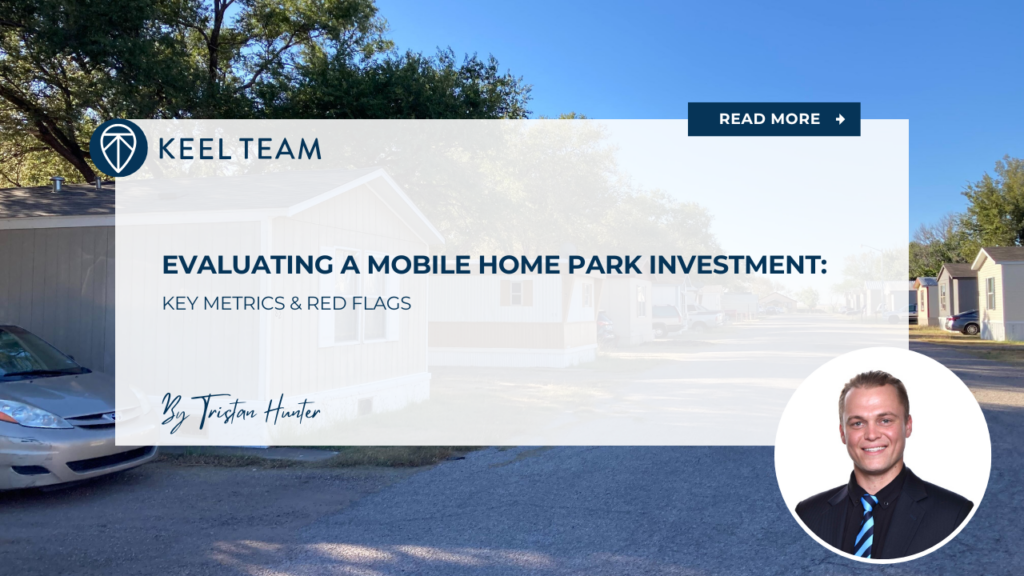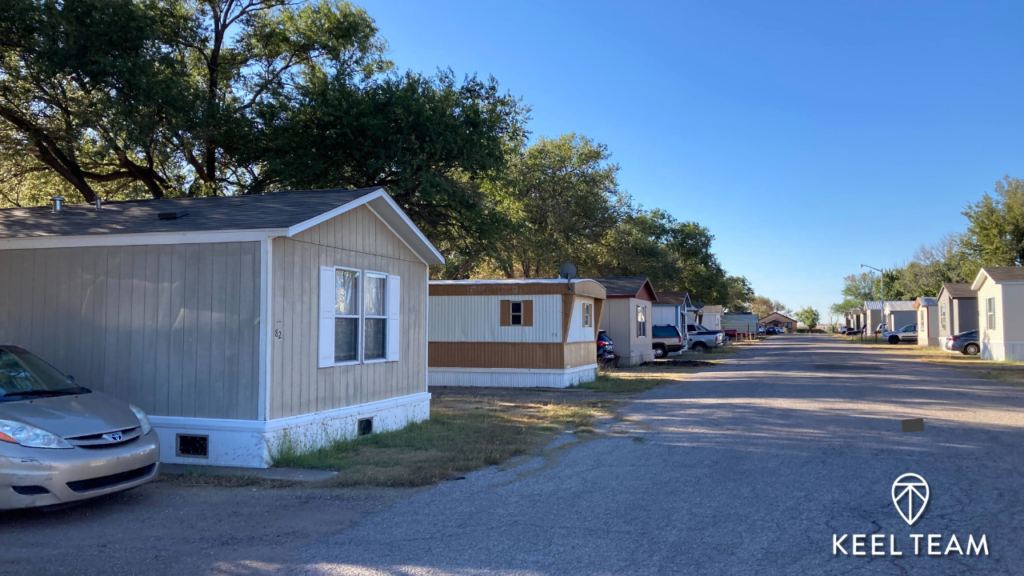Evaluating a Mobile Home Park Investment: Key Metrics & Red Flags
-
 Tristan Hunter - Investor Relations
Tristan Hunter - Investor Relations

When you consider a mobile home park investment, it can be helpful to evaluate several key factors before making any decisions. Mobile home parks can offer unique opportunities, but they also present potential challenges that may affect long-term returns. By examining critical metrics and identifying common red flags, you might gain insights into whether a mobile home park could align with your investment goals. While nothing guarantees success, conducting thorough due diligence often increases your chances of making more informed choices.
1. Understanding the Local Market
Before evaluating a mobile home park investment, you could start by researching its local market. Look at the economic trends in the surrounding region. Consider unemployment rates, population growth, and job opportunities. If the area seems to have stable employment options and a steady or growing population, the mobile home park may have a better chance of retaining tenants. Additionally, analyze the supply of affordable housing options. A mobile home park that offers competitive rents in a region with limited affordable housing may attract a more consistent tenant base. On the other hand, a mobile home park located in a declining area could face challenges in maintaining occupancy.
2. Evaluating Occupancy Rates and Rent Levels
Occupancy rates typically serve as a vital metric when evaluating a mobile home park. Higher occupancy rates often suggest that tenants find value in the property. However, you might want to look beyond the current occupancy and also consider historical trends. Have occupancy rates declined over time? Are tenants frequently moving out? If so, it might indicate underlying issues such as poor management, undesirable location, or lack of amenities.
Rent levels also deserve attention. Compare the mobile home park’s lot rents to other local mobile home parks and comparable housing options. Are the rents competitive? If rents seem much higher than average without justifying reasons, attracting and retaining tenants might become more challenging. Conversely, if the mobile home park offers very low rents, it may draw tenants, but the property might struggle to generate sufficient returns in the beginning stages.
3. Analyzing Utility and Infrastructure Conditions in the Prospective Mobile Home Park Investment
Another key area involves understanding the state of the mobile home park’s utilities and infrastructure. Consider the age and maintenance history of water, sewer, and electrical systems. You may ask about recent inspections or look for documentation that reveals any ongoing issues. A mobile home park with outdated infrastructure might require costly repairs, which could affect your financial projections. Additionally, substandard utilities might impact tenant satisfaction and retention, so you may wish to factor in any potential upgrade costs into your evaluation.
Download our FREE eBook on the Top 20 things to know BEFORE investing in mobile home parks!
4. Reviewing Tenant Profiles and Stability in the Prospective Mobile Home Park Investment
When evaluating a mobile home park, tenant profiles, and stability may offer valuable clues. Consider the type of residents who occupy the property. Are they long-term tenants who show pride in their homes and surroundings? Stable tenants who pay rent on time and maintain their lots may reduce turnover costs and help foster a positive community atmosphere.
On the other hand, if the mobile home park frequently experiences late payments or evictions, it could indicate weaker tenant stability. High turnover might lead to increased maintenance and marketing costs. While having a few reliable tenants does not guarantee ongoing stability, a balanced and responsible tenant base might reduce some investment risks.
5. Assessing Management Practices and Responsibilities
A mobile home park’s management often plays a crucial role in its success. Consider how the property currently operates. Are there clear procedures for rent collection, rule enforcement, and maintaining common areas? Well-defined processes might reduce disputes and help maintain a positive environment. Onsite management typically adds value, but it could also increase operating expenses. You could review whether the current management seems proactive or reactive. If the mobile home park’s operator addresses issues promptly and focuses on tenant satisfaction, it may show positive leadership.
If you plan to change management after purchase, you may want to factor in transition challenges. A new system might introduce improvements, but it could also temporarily disrupt routines. Weigh the potential benefits of improved management against the time and costs required to implement changes.
6. Investigating Demand in the Surrounding Area of the Prospective Mobile Home Park Investment
Demand factors can influence a mobile home park’s long-term viability. If the local market provides stable or increasing demand for affordable housing, your mobile home park may have fewer issues attracting renters. You might research population growth, local employment opportunities, and access to amenities like schools and shopping centers. The convenience and attractiveness of the mobile home park’s location often influence tenant decisions. While you cannot guarantee that population trends will remain positive, exploring these factors may help you gauge potential future performance.
7. Identifying Common Red Flags
When evaluating a mobile home park, spotting red flags could help you avoid investing in a property that might present ongoing challenges. One common warning sign involves deferred maintenance. If roads appear in poor condition, landscaping looks neglected, or common areas seem run-down, you might face substantial repair costs down the line.
Another potential red flag involves unclear ownership records and incomplete financial documentation. When the seller cannot provide transparent financial statements, you may struggle to understand the property’s true operating expenses and revenue streams. This lack of clarity makes it harder to project future returns. Additionally, frequent complaints from tenants or ongoing legal disputes might signal issues that require careful consideration.

A Mobile Home Park Investment in Canyon, TX
8. Examining the Financials in Detail
Before purchasing a mobile home park, you may want to review detailed financials. This often includes rent rolls, expense reports, tax records, and any available profit and loss statements. Pay close attention to utility expenses, maintenance costs, and insurance premiums. High or unpredictable expenses could indicate problems that might limit the mobile home park’s profitability.
You might also consider the loan terms if you plan to finance the mobile home park. Interest rates, loan-to-value ratios, and other lending criteria may affect cash flow. While you cannot be certain that past performance predicts future results, analyzing historical and current financial data could help you understand potential operating challenges.
9. Conducting On-Site Inspections at the Prospective Mobile Home Park Investment
While reviewing documents and spreadsheets might provide valuable information, visiting the mobile home park in person could offer additional insights. An on-site inspection might help you assess the property’s condition more accurately. Look for well-maintained lots, functioning streetlights, and tidy community areas. Examine the condition of homes within the mobile home park. While some older homes may appear dated, their upkeep might still be solid. If you notice multiple vacant lots or abandoned homes, consider whether this might affect the overall appeal.
Additionally, talk to the tenants if possible. Although some might not share detailed concerns, friendly conversations could help you learn about day-to-day conditions. Also, speaking with the current manager or maintenance staff might highlight issues that do not appear in financial documents.
10. Final Considerations Before Making a Decision
Once you have gathered information, you may want to take a step back and consider all the factors together. Remember that every mobile home park is unique, and certain metrics might matter more to you than others. Evaluating a mobile home park investment involves considering location, tenant stability, financial records, and property conditions. No single factor guarantees a good or bad investment. Instead, combining multiple data points might help you determine whether the property aligns with your goals.
If some aspects raise questions, you may consider consulting a professional who specializes in mobile home park transactions. A local real estate attorney or property inspector might identify potential challenges that you overlooked. Their insights, combined with your evaluation, may help you form a more well-rounded understanding of the property’s potential.
Conclusion
Evaluating a mobile home park often involves looking at several metrics, from local market trends to management practices and infrastructure conditions. While you cannot predict future outcomes with certainty, you may gain a better sense of a mobile home park’s strengths and weaknesses by conducting thorough research and careful analysis. Paying attention to occupancy rates, tenant profiles, and financial data, as well as identifying common red flags, might help you make more informed decisions. With a careful and diligent approach, you could improve your chances of finding a mobile home park that aligns with your investment strategy.
Are you looking for MORE information? Book a 1-on-1 consultation with Andrew Keel to discuss:
- A mobile home park deal review
- Due diligence questions
- How to raise capital from investors
- Mistakes to avoid, and more!
Disclaimer:
The information provided is for informational purposes only and is not investment advice or a guarantee of any kind. We do not guarantee profitability. Make investment decisions based on your own research and consult registered financial and legal professionals. We are not registered financial or legal professionals and do not provide personalized investment recommendations.

Tristan Hunter - Investor Relations
View The Previous or Next Post
Subscribe Below 👇





